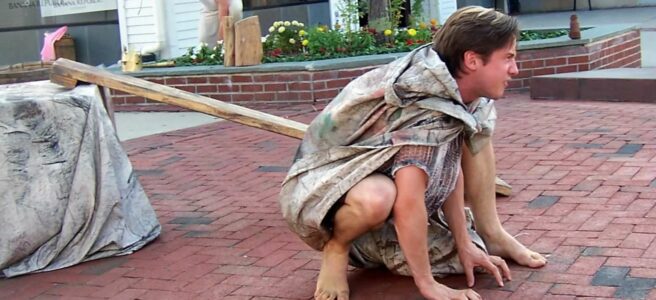Ok, ok, I want to play too. Over the last week or so I’ve seen lists for tv shows, family movies, horror movies – everything to get you in the Halloween mood. But what about our little corner of the world? Doesn’t Shakespeare have anything to get us into the Halloween Spirit? Here’s my contribution:
Twelfth Night
You’re a girl? Dress up like a boy. You’re a boy? Dress up like a girl dressing up like a boy. Twelfth Night’s main character spends the whole play in costume. We discovered, a few months back, that she’s not even called by her real name until the very end of the play!
Julius Caesar
Why just be any ghost, when you can be Great Caesar’s Ghost(*)? Don’t skimp on the knife wounds, or the blood. Lots and lots of blood. Or if you really want to wear a toga and don’t want to get blood all over it, dip your arms in the red stuff up to your elbows, then go as Brutus.
(*) Bonus points if you can actually convince somebody to dress up like J Jonah Jameson from the Spiderman movies, and then spend the night pointing at you and shouting that.
Hamlet
I knew Hamlet would make a good costume when my 4yr old spotted the idea on one of his cartoon shows. After random channel flipping he comes running into my office to tell me “Daddy, somebody on tv is dressed like Shakespeare!” Along comes the 6 and 8yr olds to tell me “Well, not Shakespeare – he’s dressed like Hamlet. He’s holding a skull and talking to it.”
Of course you could also go with Ophelia, although taking a quick jump in the pool before going out trick or treating might cause you to catch your death (ha!). Then again why not go as Hamlet’s father’s ghost? I’ll leave it up to reader imagination to depict how exactly you’d walk around wearing your beaver up.
Or you could do like I did, and go as Yorick.
The Tempest
A witch (although, granted, she doesn’t really make much of an appearance), a wizard, a sea monster, an airy spirit. Plenty of opportunity here to take a traditional Halloween costume and really run with it. If you want to get really creative, grab a partner and dress up as Stefano and Trinculo. I always described them as pirates to my kids, although “court jester” is probably more accurate.
Titus Andronicus
How can you not have fun dressing up like Titus? Put on a chef’s hat and bloody apron, carry a cleaver and a big stew pot. Throw a prop head in it, maybe a prop hand while you’re at it. Shakespeare’s goriest tragedy is often compared to a modern slasher movie, so why not just go completely over the top with it? Bring along your daughter. Don’t let her talk.
Macbeth
Ghosts make plenty of appearances in Shakespeare’s work, The Tempest and Midsummer are both loaded with magical goings on … but really, is there any play scarier than Macbeth? Dress up like a weird sister, dress up like Banquo’s ghost. Or maybe a sleepwalking Lady Macbeth, covered in blood? For the really inside reference, go as Macduff – carry around Macbeth’s head.
A Midsummer Night’s Dream
Fairies are timeless, in more ways than one. If you need a couple’s idea, why not Titania and Oberon? I love the idea of an entire family dressing up as Midsummer, with the kids playing the roles of Cobweb, Mustardseed and the others. Or go in a completely different direction and make an ass of yourself, literally.
Have I forgotten any? You can always throw on your monk’s outfit and go as Friar Laurence (carry around a pickaxe, crowbar or some other tomb-opening implement for extra credit), or really grab any random “Elizabethan” or “Renaissance” costume from the local store and say that you’re the lead in As You Like It, Much Ado, or any of the other romantic comedies.
What else? Who’s got the creative ideas?

 Over the years I’ve seen many Shakespeare lists. Instead of linking to yet another one I thought it would be fun to combine several and come up with my own, the Shakespeare Geek Top 10. This is not my opinion, this is the mathematical analysis (according to my own algorithm :)) from a variety of places, some here and some elsewhere, that people have voted on a general “top 10” for Shakespeare’s plays.
Over the years I’ve seen many Shakespeare lists. Instead of linking to yet another one I thought it would be fun to combine several and come up with my own, the Shakespeare Geek Top 10. This is not my opinion, this is the mathematical analysis (according to my own algorithm :)) from a variety of places, some here and some elsewhere, that people have voted on a general “top 10” for Shakespeare’s plays.